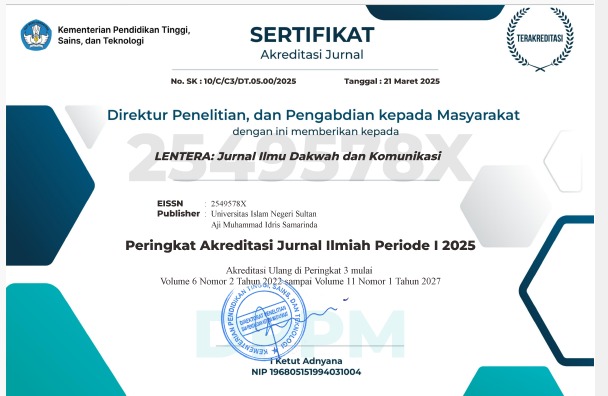ETIKA BERKOMUNIKASI DALAM AL-QUR’AN ANALISIS PENAFSIRAN HASBI ASH-SHIDDIEQI DALAM TAFSIR AN-NUR
Abstract
For Muslims, al-Qur’an is considered a book of guidance for humankind to navigate every aspect of their life in the world including communication as one of the most important aspects of human life. Because communication is very important for humankind, Islam provides guidelines on how to conduct such activity according to the Qur’an and the Hadith. The Qur’an contains many verses using the term “qaul”, a type of adjectives that can be addressed as general guidelines since such adjectives usually refer to the notion of the ethics of communication. Those Qur’anic verses using the term “qaul” are qaulan ma’rufa, qaulan karima, qaulan layyina, qaulan baligha, and qaulan sadida. According to Hasby ash-Shiddieqi, Islamic ethic of communication involves guidelines on how to convey a message in a way that its wording is concise, clear, and free from negative intention to harm others. Such messages must also comply with the general norms that they must be educative and effective to the audience. Hence, such messages should use attractive words in order to have positive impact on the mind of the audience.
Keywords: Ethics of communication, Qur’anic communication, Qur’anic exegesis.
References
Hamdani, Fikri, Hasbi Ash-Shiddieqi dan Metode Penafsirannya, dalam jurnal “Rausyan Fikr, V0l.12, No. 1 Juni 2016, Fakultas Ushuluddin, Adab dan dakwah Institut Agama Islam Negeri (IAIN) Palu.
Hefni, Harjani, Komunikasi Islam, Jakarta: PrenadaMedia Group, 2015.
Ilyas, Yunahar, Konstruksi Pemikiran Gender dalam Pemikiran Mufasir, Jakarta: Program Peningkatan Kualitas Pelayanan Publik Ditjen Bimas Islam dan Penyelenggaraan Haji Departemen Agama, 2005.
Ismatulloh, A.M, Penafsiran M. Hasbi Ash-Shiddieqi Terhadap ayat-ayat Hukum Dalam Tafsir An-Nur, dalam Jurnal Mazahib, Volume. XIV, Nomor 2, Desember 2014, Jurusan Syariah dan Ekonomi Islam STAIN Samarinda.
Mandzur, Ibnu, Lisan al-‘Arab, Beirut: Dar Shadir, 1992.
Muhammad Hasbi Ash-Shiddieqy, Teungku, Sejarah dan Pengantar Ilmu Hadits, Semarang: Pustaka Rizki Putra, 2009.
………………………………………………, Tafsir Al-Quranul Majid, Jilid I, Cet.1, edisi ke-3 Jakarta: Cakrawala Publishing, 2011.
Mujahidah, Komunikasi Dalam Kelompok, Dalam Jurnal “Lentera”Vol. VIII, N0.2, Desember 2007, Jurusan Dakwah dan Komunikasi Sekolah Tinggi agama Islam Negeri Samarinda.
Shobah, Nurul, Menumbuhkembangkan Kebiasaan Membaca Di Perguruan Tinggi “Suatu Analisis Tentang Komunikasi Tulisan”, dalam Jurnal Lentera, Vol. VI, No. 2, Desember 2006, Sekolah Tinggi Agama Islam Negeri (STAIN) Samarinda.
Suprapto, Bibit, Ensiklopedi Ulama Nusantara “ Riwayat Hidup, Karya, dan Sejarah Perjuangan 157 Ulama Nusantara, Jakarta: Gelegar Media Indonesia, 2009.
Copyright (c) 2018 LENTERA: Jurnal Ilmu Dakwah dan Komunikasi

This work is licensed under a Creative Commons Attribution-ShareAlike 4.0 International License.
Penulis yang menerbitkan artikel di Lentera: Jurnal Ilmu Dakwah dan Komunikasi setuju dengan ketentuan berikut:
- Penulis memiliki hak cipta artikel dan memberikan hak jurnal untuk publikasi pertama dengan karya yang secara simultan dilisensikan di bawah CC-BY-SA atau The Creative Commons Attribution – ShareAlike Licence.
- Penulis dapat membuat perjanjian kontrak tambahan yang terpisah untuk distribusi non-eksklusif versi jurnal yang diterbitkan dari karya tersebut (misalnya, mempostingnya ke repositori institusional atau menerbitkannya dalam sebuah buku), dengan pengakuan atas publikasi awalnya di jurnal ini.
- Penulis diizinkan dan didorong untuk memposting pekerjaan mereka secara online (misalnya, dalam repositori institusional atau di situs web mereka) sebelum dan selama proses pengajuan, karena dapat menyebabkan pertukaran yang produktif, serta kutipan yang lebih awal dan lebih besar dari karya yang diterbitkan (Lihat The Effect of Open Access)
Authors who publish articles in Lentera: Jurnal Ilmu Dakwah dan Komunikasi agree to the following terms:
- Authors retain copyright of the article and grant the journal right of first publication with the work simultaneously licensed under a CC-BY-SA or The Creative Commons Attribution–ShareAlike License.
- Authors are able to enter into separate, additional contractual arrangements for the non-exclusive distribution of the journal's published version of the work (e.g., post it to an institutional repository or publish it in a book), with an acknowledgment of its initial publication in this journal.
- Authors are permitted and encouraged to post their work online (e.g., in institutional repositories or on their website) prior to and during the submission process, as it can lead to productive exchanges, as well as earlier and greater citation of published work (See The Effect of Open Access).












.png)
